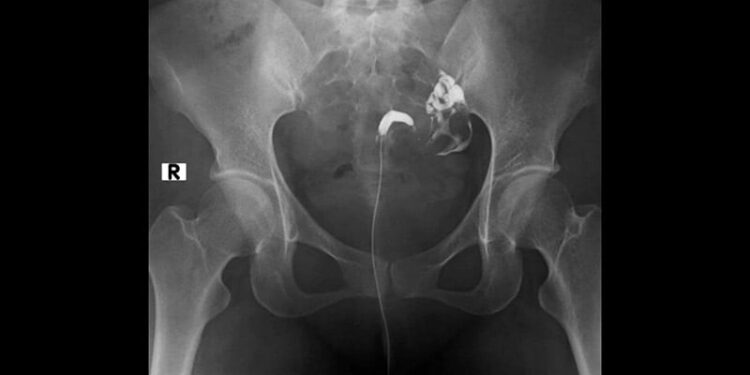Key Takeaways
The presence of foreign objects in the urethra or bladder often results from unconventional sexual practices. Patients may be reluctant to disclose these circumstances and fail to attend follow-up appointments, complicating diagnosis and treatment, which can lead to serious health risks and a reduced quality of life.
Michael Godzisz, MD, from the Department of Urology and Oncological Urology, Medical University of Lublin, in Lublin, Poland, and colleagues have documented several cases of foreign object findings in the urethra and the specific challenges associated with them.
Case 1
On May 15, 2005, a 34-year-old man presented with acute haematuria. During the medical examination, a cord protruding from the external opening of the urethra was observed. The patient did not disclose the events leading to the presence of the cord in the urethra. An x-ray of the pelvis revealed a coil of wire within the urinary bladder, which precluded removal through the transurethral approach. The patient subsequently underwent cystotomy with removal of the foreign body. The post-operative period was uncomplicated. However, the patient did not attend the follow-up visits.
Case 2
On April 08, 2007, a 25-year-old woman was admitted to the hospital with recurrent urinary tract infections accompanied by urination difficulties. During the gathering of her medical history, she confided to the doctor that she had lost a pen in her bladder 5 weeks earlier while masturbating. Cystoscopy was performed, and the foreign body was removed via a transurethral approach. The patient attended a follow-up visit without complications.
Case 3
On November 21, 2008, a 32-year-old man presented with severe haematuria. He had been treated for recurrent lower urinary tract infections for 3 years. The patient reported having inserted a nylon string into the urethra while under the influence of alcohol a few years prior to his current hospitalisation. Cystoscopy revealed a calculus on the coils of the string. The patient underwent cystolithotomy, and the stone was successfully removed. The post-operative period was uncomplicated; however, the patient did not attend follow-up visits.
Case 4
On December 23, 2010, a 63-year-old man was admitted to the hospital with a hairpin lodged in his urethra. The patient had inserted it to achieve penile rigidity. An x-ray of the kidneys, ureters, and bladder confirmed the pelvic location of the hairpin. He underwent open surgery, during which the foreign body was removed. The post-operative follow-up was without complications.
Case 5
On June 30, 2012, a 46-year-old woman under the influence of alcohol presented with a thermometer in her bladder. She claimed that she had attempted to measure her body temperature and could not explain how the thermometer ended up in the urinary bladder. After an x-ray, the foreign body was removed under spinal anaesthesia using Randall forceps. The patient did not attend the follow-up visits.
Case 6
On October 04, 2012, a 43-year-old woman presented after accidentally inserting an elongated plastic object into her urinary bladder. She claimed that she used the object to enhance her sexual experience during intercourse. The object was removed endoscopically using Randall forceps. The patient attended a follow-up visit, and there were no post-operative complications.
Case 7
On May 05, 2013, a 16-year-old girl presented with abdominal pain and pyuria. An x-ray of the kidneys, urethra, and bladder revealed a calculus associated with an oblong object. The patient reported that it was a fragment of a pen that she had inserted into her urinary bladder while masturbating 1 year prior to her hospital visit. Under spinal anaesthesia, the calculus and the fragment of the pen were removed during cystoscopy using lithotripsy. The patient did not attend the follow-up visits.
Discussion
“The diagnostic process and subsequent follow-up after treatment can be problematic, as patients often struggle to explain the circumstances surrounding their actions,” wrote the study authors.
The authors noted that compiling these case reports may help raise awareness among healthcare professionals and patients that inserting objects into the urethra can lead to severe health complications and lead to unnecessary surgical interventions, ultimately lowering patients’ quality of life.
This story was translated from Univadis Germany.
Source link : https://www.medscape.com/viewarticle/risky-self-love-unusual-cases-emergency-room-2025a1000dhd?src=rss
Author :
Publish date : 2025-05-28 11:17:00
Copyright for syndicated content belongs to the linked Source.














